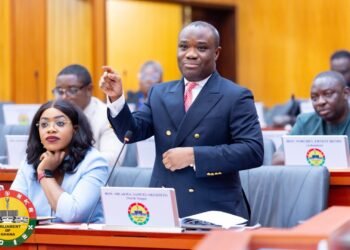Africa, home to the world’s youngest and fastest-growing population, stands at a crucial juncture in its development trajectory. To harness this immense potential and propel the continent toward sustainable economic growth, African leaders need to prioritize the development of human capital.
Flagbearer of the National Democratic Congress, John Dramani Mahama, has called on African Leaders to focus on developing human capital to drive economic growth.
Speaking to students at the London School of Economics (LSE), Mahama reflected on the rapid changes in the digital landscape over the past decade and the emergence of new job roles within the continent.
“Africa must develop the human capital required to propel our economies forward. The digital landscape, for example, was vastly different when I last spoke at the LSE a decade ago. Many job roles we see today were non-existent or just emerging in Africa. The job market is rapidly evolving, and our education systems must evolve as well.”
H.E. John Dramani Mahama
Access to information and communication technology (ICT) is vital in today’s interconnected world. African leaders must prioritize improving internet connectivity, expanding digital infrastructure, and promoting digital literacy across the continent.
Bridging the digital divide will empower individuals with the tools necessary to access online education, participate in the digital economy, and leverage technology for innovation and entrepreneurship.
John Dramani Mahama called for a shift beyond traditional academic learning to include vocational and technical training, aligning with the technological advancements of the time.
Education is the cornerstone of human capital development. African leaders must prioritize quality education that is accessible, inclusive, and relevant to the needs of a rapidly evolving job market.
By investing in early childhood education, primary and secondary education, and vocational training, governments can equip individuals with the knowledge and skills necessary to compete in the global economy. This investment should also focus on bridging the gender gap in education, ensuring that both sexes have equal access to quality learning opportunities.
“We must embrace technology and innovation and expand beyond academic learning to emphasize vocational and technical training. The career aspirations of our children today reflect this technological evolution, and it is our responsibility to ensure that they are prepared for the future job market.”
H.E. John Dramani Mahama
Also, the former President noted that the job market is evolving at an unprecedented pace, necessitating an evolution in the African education systems.
As the global economy rapidly evolves, African leaders must emphasize skills development to meet the demands of emerging industries and technological advancements. Governments should collaborate with the private sector to identify future skills requirements and design training programs that equip individuals with the necessary expertise.
Encouraging entrepreneurship, fostering research and development, and promoting innovation ecosystems will drive economic diversification, and job creation, and ensure Africa remains globally competitive.
Africa’s youthful population presents a unique advantage that, if properly nurtured, can catalyze economic growth. However, without adequate investment in education and skills development, this demographic dividend risks transforming into a burden of unemployment, social instability, and missed opportunities.
By redirecting resources towards human capital development, African nations can unlock the full potential of their populations, creating a skilled and productive workforce that can drive innovation and entrepreneurship.
Africa’s leaders must recognize that investing in human capital is not merely an expense but rather a transformative strategy for sustainable economic growth. By prioritizing education, healthcare, skills development, and innovation, African nations can unlock the full potential of their populations, creating a workforce that is equipped to address the challenges of the future.
Moreover, by reducing inequality, fostering social cohesion, and promoting inclusive growth, African leaders can ensure that the benefits of economic development are shared by all, ultimately leading to a prosperous and thriving continent.
READ ALSO: Human Trafficking Surges In Effutu























